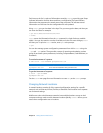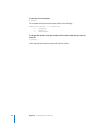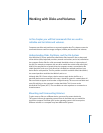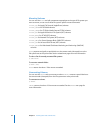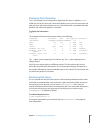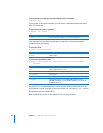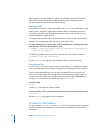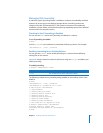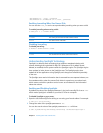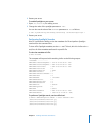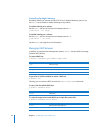
Chapter 7 Working with Disks and Volumes 87
The scripts use values in the following configuration files to determine whether and
how to reclaim space:
 The script /etc/periodic/daily/600.daily.server runs daily. Its configuration file is
/etc/diskspacemonitor/daily.server.conf.
 The script /etc/periodic/weekly/600.weekly.server is intended to run weekly, but is
currently empty. Its configuration file is /etc/diskspacemonitor/weekly.server.conf.
 The script /etc/periodic/monthly/600.monthly.server is intended to run monthly, but
is currently empty. Its configuration file is /etc/diskspacemonitor/monthly.server.conf.
As configured, the scripts specify actions that complement the log file management
performed by the services listed above, so don’t modify them. All you need to do is log
in as an administrator and use a text editor to define thresholds in the configuration
files that determine when the actions are taken. For example:
 The number of megabytes a log file must contain before its space is reclaimed.
 The number of days since a log file’s last modification that need to pass before its
space is reclaimed.
Specify one or both thresholds. The actions are taken when either threshold is
exceeded.
There are several additional parameters you can specify. See comments in the
configuration files for information about all the parameters and how to set them.
The scripts ignore all log files except those for which at least one threshold is present
in the configuration file.
To configure the scripts on a server from a remote Mac OS X computer, open a Terminal
window and log in to the remote server using SSH. Then, open a text editor and edit
the scripts.
You can also use the
diskspacemonitor tool to reclaim disk space.
Erasing, Modifying, Verifying, and Repairing Disks
You can use diskutil to erase, modify, verify, and repair disks. This command provides
functionality that overlaps with the functionality of pdisk, newfs_hfs, and disktool. For
example, you can use both diskutil and pdisk to partition a disk. However, unlike
pdisk, which lets you partition tables at their most basic level by setting the exact base
address and partition length in blocks, diskutil lets you partition a disk automatically
by calculating the base address and the partition length in blocks based on the
partition size you specify.
The
diskutil tool allows you to perform the following actions on a disk:





